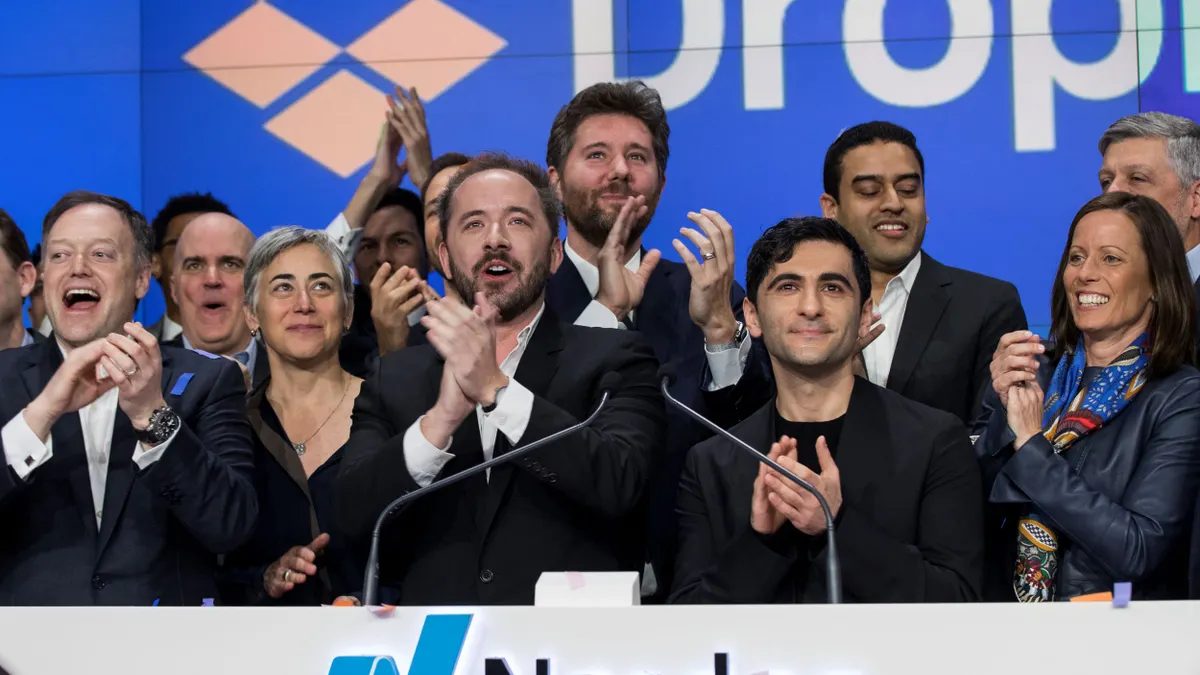Business leaders are looking to CFOs more than any other c-suite executive to help guide organizations as they navigate sweeping digital disruption. CFOs are up to the task, but they may not be ready quite yet, said Ash Noah, managing director of CGMA learning, education and development at the Association of International Certified Professional Accountants.
Noah has fine-tuned his predictions over his many decades in the finance industry. He told CFO Dive Monday the ways in which he has seen the finance function evolve with the introduction of new technology and how CFOs' operational and strategic insights have made them company leaders across industries.
How tech has disrupted the traditional business model
Noah has acknowledged "unprecedented change" as a result of digitization and new technology. The changes drive the business fundamentals and the type of support and partnering the business needs,” he said. In January, Noah worked on a study, “Re-inventing finance for the digital world,” to this effect. The study found that with the introduction of more and more technology, the finance function will no longer be evaluated purely on how costly it is to run, but will be judged on the added value it brings to the organization.
"In my former life as a CFO, I was really trying to help businesses make the right decisions. I helped with predominantly operational business decisions," he explained. "What I’ve seen, more and more, is technology disrupting business models. Not just the digitization of finance, but the digitization of the whole business model. That’s what’s fundamentally driving the change."
In his current role, Noah is a liaison to CFOs and CEOs, helping them and their teams create value while maintaining an understanding of how finance is evolving. Before joining the association in 2012, Noah served as CFO of the international unit of global transport and logistics provider TNT Express, leading finance teams in 45 countries through wide-scale transformations.
Change results in "guidance gap"
This changing environment has taken the largest toll on the finance department, Noah said. "Suddenly the business is saying, 'Mr. CFO, I need your help, I need you by my side. There are seismic changes taking place in my business, and I need help navigating through this situation, and redefining my strategy, and surviving.'"
Even as the CFO role keeps evolving, Noah says the change isn't as new as it may seem. "The finance role has always been strategic in nature,” he explained. “It’s just that we have not delivered what businesses have required."
Noah points to what professionals call "the guidance gap," which is "the guidance businesses need and what the CFO has provided," he said. Noah says the S&P 500 reports a gap of 65%, meaning CFOs only provide apt business guidance 35% of the time.
"That’s a massive gap [between] where CFOs should be, with regards to supporting the business, and where they are," he said. "The gap is predominantly caused by massive acceleration, in terms of business models, and CFOs haven’t been able to keep up."
The CFO’s primary challenge, in the wake of all these expansions and changes, is to close the guidance gap.
Early steps towards digital revolution
Consider the new regulations, such as PCAOB, that came after the Sarbanes-Oxley Act of 2002, Noah says. "All that was really focused on compliance. From early 2000 right up to the crash of 2008, CFOs' offices focused on addressing the governance gap, and making sure the numbers were accurately reported, and procedures were controlled and operating effectively."
Since the crash, however, executive focus has shifted to survival, cutting costs, reengineering the business model, and trying to outdo competition, Noah recalls. As businesses rebounded into recovery, new technologies became available for gathering and interpreting data.
"I told CFOs that this technology isn't disrupting their role, but allows them to become strategic business advisors," Noah said. "If they can leverage these technologies, and get the right pool of talent with the right competencies, they can really deliver what the business needs. This [enables finance to] truly become that value-adding front office activity rather than transactional back office function we’ve always been."
Taking advantage of this transformational technology does not require CFOs becoming data engineers or data scientists. Noah says they need only the proficiency to partner with the business and understand how data and tech can be leveraged.
"Tech lets us find trends and relationships and insights that humans can't," he said, but companies need to communicate that without threatening their business. "Provide the business with alternatives, explain the insights, and explain what it means to the customer," he recommends.
Digital savvy-ness required for change preparedness
This communication is absolutely essential for the CFO to become a strategic advisor, drive value, and participate in the change that many enterprises are transforming in those ways. The question to pose — is finance playing a part in that transformation? Noah has found that finance teams are more digitally savvy.
CFOs who consider themselves digitally savvy are able to support their enterprises much more effectively than those who aren't. Only about 37% of CFOs consider themselves digital leaders; the rest said they’re not participating in that enterprise-wide transformation, Noah found in his January study, “Agile Finance Unleashed: The Key Traits of Digital Finance Leaders.”
At the end of the day, what Noah wants to do is help build out finance capabilities so that CFOs and their teams can actually participate in future value creation. "That’s the whole thrust of our institution," he said. "Building teams and finance capabilities by finding the right skills and competencies. We’re not tech the providers or consultants. What we do is help the profession identify and articulate appropriate skills, and create the programs to build them so CFOs don’t have to figure it all out alone."




















